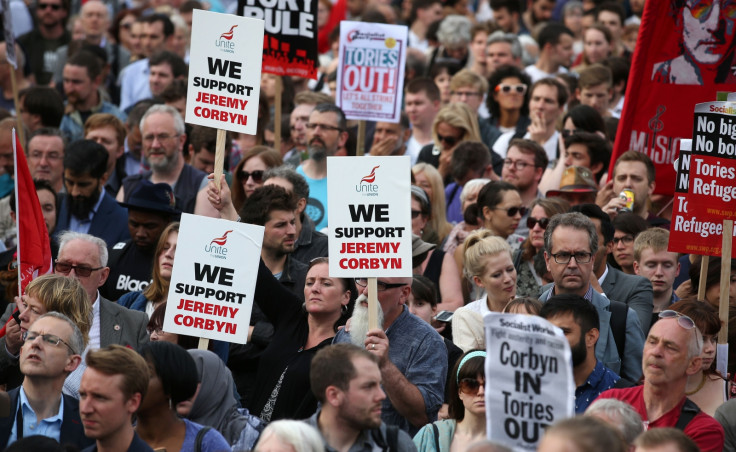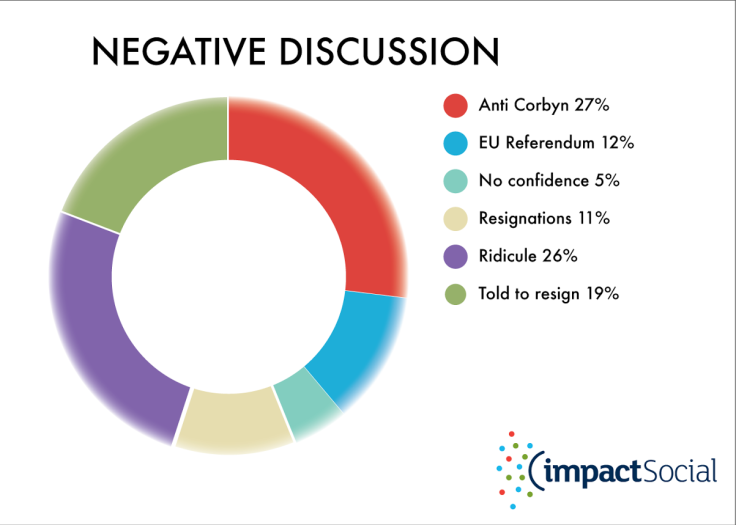Jeremy Corbyn doesn't care about popularity – can Labour resignations force him to quit?
For Corbyn, the Labour Party is a vehicle of defiance and posture, not an instrument with which to govern.

Anyone surprised by Jeremy Corbyn's defiant reaction to the vote of no confidence in him on Wednesday (28 June 2016) has not been paying attention. For no matter how awkward the situation has become, he has radiated both his familiar calm and the sort of spikiness most often seen on a man who suspects the bloke on the next allotment of purloining his leeks.
No matter the accusation, the reaction is the same – the lame 'I did all I could' defence of his lackadaisical 'support' for the Remain campaign in the EU referendum; then the Thick of It splendour of yesterday's filmed Shadow Cabinet meeting took the awkwardness to new heights, culminating in the comprehensive rejection of their leader by the Parliamentary Labour Party by 172 votes to 40.
This left him with fewer supporters than appointees to his Shadow team, yet he could still look people in the eye and say:
"I was democratically elected leader of our party for a new kind of politics by 60% of Labour members and supporters, and I will not betray them by resigning. Today's vote by MPs has no constitutional legitimacy."
That is some chutzpah. He's gone full Millwall to his colleagues: you don't like me, and I don't care.
He falls back, with practiced ease, on his mandate, the size of his victory within the wider party – both long-term members and the £3-membership associates – and the continued support of the unions ('From the people who brought you Ed Miliband...'). That would, presumably, be tested as his competence and performance since his election as leader now puts a new perspective on the new kind of politics he promised. People wanted 'new'; it remains to be seen if they wanted 'inept'.
And as Tom Watson is alleged to have told him in one of the many 'stormy' meetings around Westminster this week – he may well win the leadership in a party vote – he's unlikely to win the keys to Number 10.
That gloomy outlook, for the Labour Party at least, is backed up by data from the social-media insight company Impact Social, who have looked at the sentiment on social and open news platforms this week around the conversations on Jeremy Corbyn. If you were a campaign manager or, heaven forbid, Seamus Milne, it wouldn't make pleasant reading.

Much of the conversation simply makes fun of him, and that is fatal: 26% of mentions are simply open ridicule. When people are going to Twitter to see what jokes they can make at your expense, then you have a serious electoral problem. Comparisons to Roy Hodgson are not flattering right now.
But there is also anger and despair. At best, he's accused of incompetence, at worst deliberate 'sabotage' of the Remain campaign, with 19% talking of his need to resign, and plenty more talking of the resignations from Shadow office and of the no-confidence vote.
He has his defenders – the ones who say that his is a man targeted by the Murdoch press or Blairites, with the Chilcott report looming. They see a principled man in danger of being bullied out of his job. They see a man worth defending.
Yet even those rallying around him don't seem to see a prime minister in waiting – and curiously, nor do they seem to want to. The social-media conversations show a man maligned, not a thwarted talent. Those who back him simply don't seem to envisage him at the black door.
And that's key to the Corbyn's chutzpah. He doesn't care about the premiership; his media handlers won't care about the overwhelming negativity on social media. They won't even care about whether he can win a general election. This isn't about prizes, or even about competence. It is about him continuing to be the head of a protest movement. It's about the purity of the struggle, not the fight for power. He sees the Parliamentary Labour Party as the inconvenient outrider of something much less rigid. For him, the Labour Party is a vehicle of defiance and posture, not an instrument with which to govern. Hence it acts more like a sect than a contemporary political party and will choose its horizons accordingly. And EU membership was, clearly, not a priority on Planet Corbyn.
So mock him all you like on social media, keep the memes coming, question his ability to do the job. But to judge him by whether he can win the race is to misunderstand the race he thinks he's entered. The difficulty the party has now is how to persuade a man playing by different rules that he's lost the game.
© Copyright IBTimes 2025. All rights reserved.






















